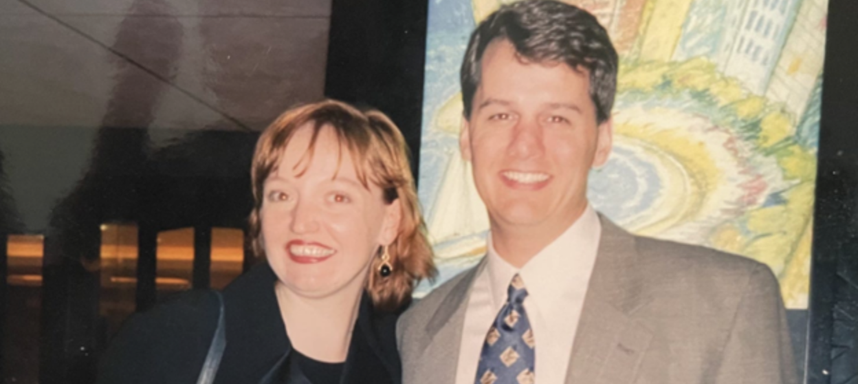A Love Story-- Interrupted.

INTRODUCTION
My husband, Bob, was fifty-five years old when we lost him. It’s destabilizing and frightening to see the men we’ve always depended on change in ways we don’t understand, especially in long marriages. I was in denial for a long time about the depth of Bob’s illness and cognitive decline. What slowly built over years only became truly clear right before his passing — and even then, I never believed I would lose him.
Sharing this story is deeply personal. But if a little vulnerability can help shift exasperation into compassion for someone else, then it is worth it.
OUR STORY
Bob and I were together for thirty-four years, married for thirty of them. We met young — I was eighteen, he was twenty-one — and we built our life together. Our marriage was rooted in shared values, humor, attraction, and mutual respect. We worked together in family businesses, raised our twin daughters, and made each other laugh every day. Our love language was mostly sarcasm and silliness.
Like any long-term relationship, we had hard seasons, but our foundation was solid. We always found our way back to each other.
If you had told us how our story would end, we would have said it wasn’t possible.
THE DAY WE LOST HIM
I once read that suicide is a “perfect storm” of circumstance and emotion — a tragic accident that otherwise would never have occurred. For Bob, that feels true. And yet, after he passed, there were assumptions made about him — whispered, suggested, or directly stated:
- He must have had financial troubles.
- He must have relapsed into alcoholism.
- The marriage must have been in trouble.
- He must have been hiding something.
- He made a selfish choice.
These assumptions are cruel — and they are wrong.
His death was not about selfishness. It was not a choice made from clarity. It was the result of an illness that went unrecognized for far too long.
It does not erase the remarkable person he was — but grief has a way of making us explain more than we should have to.
LOOKING BACK: WHAT WE MISSED
For years, I thought Bob’s challenges stemmed from increased alcohol use. What I now believe is that his migraine-induced stroke at age 31 caused vascular dementia that slowly worsened over decades.
The signs were there, but we didn’t know what we were looking at:
- Cognitive decline masked by hard work
- Mood swings and anger replacing confidence
- Paranoia and anxiety that were not his personality
- Significant weight loss
- The inability to function the way he always had
He wasn’t just stressed. He was unwell.
And I didn’t recognize it. I was waiting for him to snap out of it.
WHAT I WISH I HAD DONE DIFFERENTLY
I do not blame myself — and I know he would not want me to.
But there are things I would do differently now:
- I wouldn’t tiptoe around his pride.
- I would have stepped in to help with the business sooner.
- I would have insisted on therapy when the anger and frustration appeared.
- I would have followed up on medication side effects.
- I would have encouraged hormone level testing.
- I would have pushed for brain imaging years earlier.
I wish I had admitted sooner that life was never going back to “normal.”
WHY THIS STORY MATTERS
Men in midlife often struggle silently.
Chronic pain, PTSD, brain injuries, addiction cycles, and cognitive decline frequently show up as:
- Irritability
- Withdrawal
- Anger
- Emotional shutdown
And because society expects men to be strong, rational, steady — they hide their suffering.
If your partner feels like a stranger, look closer, not away.
Compassion does not mean giving up your boundaries.
But it can mean saving a life.
CLOSING THOUGHT
I don’t know if anything could have changed our outcome — but I want to plant a seed for someone else.
If you see your partner struggling, please, look deeper.
Ask the harder questions.
Care louder than pride whispers.
If you are facing this — my heart is with you.


